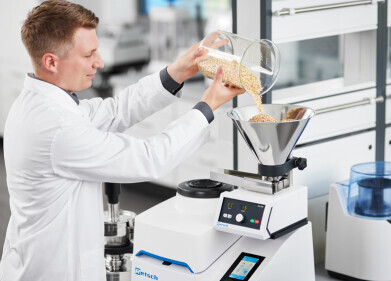Sample preparation
Free Webinar on Quality Control of Food & Beverages
Sep 03 2024
Do you encounter challenges in maintaining highest quality and safety standards in your food & beverage research and production?
In this webinar you will learn about best practices in sample homogenization, particle characterization, ashing, as well as protein and thermogravimetric analysis to ensure reliable analysis results every time.
Date: 24 September 2024
These are the topics that will be treated in this webinar:
RETSCH: How to conduct reproducible sample preparation for food analysis
For accurate analysis results, sample preparation should be as efficient as possible to ensure that the sample truly reflects the original sample. Based on numerous application examples, RETSCH will explain how to find the best suited preparation method for specific materials as well as the appropriate laboratory mill, including cryogenic grinding technology.
MICROTRAC: Is Dynamic Image Analysis the best method for quality control of coffee powder?
The grind size of coffee powder has a direct influence on the taste of the beverage, and different forms of preparation require specific particle size distributions. Coffee powders have a wide range of particle sizes and therefore pose a challenge to the measurement equipment. With numerous application examples we will demonstrate why image analysis is the best suited method for characterizing coffee powder particles.
MICROTRAC: The Future of Food: Enhancing Plant Protein Integration with Turbiscan Technology
Plant-based protein use has been expanding over the past years and offers numerous advantages: sustainable origins, vegan alternatives, cost-efficiency, and health benefits. Proteins obtained from sustainable sources do not have the same performance compared to conventional emulsifiers, and selecting the right protein can represent a bottleneck in product development. In this slot we present solutions to study the emulsifying and stabilizing properties of plant-based protein in a single experiment.
CARBOLITE GERO & ELTRA: Drying and ashing of organic substances and analysis of the nitrogen/protein content according to the Dumas method
Before analyzing large amounts of organic matter, it is recommended to dry and remove the water it contains. Otherwise, the ashing process will be slowed down and inhibited, and a strong odor will appear. The resulting dry mass is the basis for protein analysis which can be carried out with ELTRA's new ELEMENTRAC CN-r analyzer in only a few minutes. ELTRA & CARBOLITE GERO understand the challenges of the process and will guide you to the right solution.
Digital Edition
ILM 50.3 April 2025
May 2025
Chromatography Articles - Optimising two-step purification: Key considerations for sample pump setups Mass Spectrometry & Spectroscopy Articles - Detecting pharmaceuticals and their transf...
View all digital editions
Events
Apr 27 2025 Portland, OR, USA
Making Pharmaceuticals Exhibition & Conference
Apr 29 2025 Coventry, UK
Apr 30 2025 Peshawar, Pakistan
May 11 2025 Vienna, Austria
May 13 2025 Oklahoma City, OK, USA



















